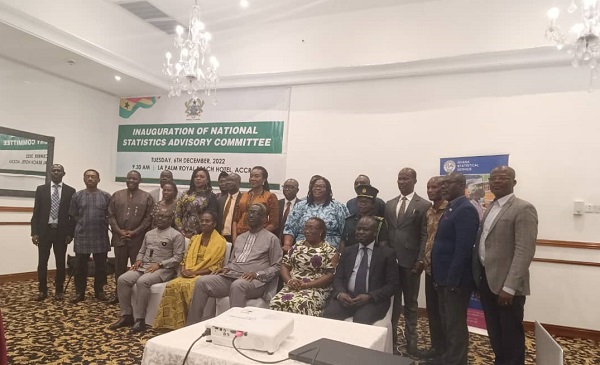|
Getting your Trinity Audio player ready...
|
The National Statistical Advisory Committee (NSAC) was inaugurated on Tuesday 6th December 2022.
The NSAC is a statutory committee established per the Statistical Service Act, 2019, (Act 1003), to strengthen the production of harmonized and quality statistics and facilitate the coordination of statistical activities within the National Statistical System (NSS).
The Committee, which comprises representatives from key producers and users of statistics, was sworn in by Dr. Grace Bediako, the Chair of the Ghana Statistical Service Governing Board.
Before the swearing-in, the Government Statistician, Prof. Samuel Kobina Annim, made a presentation on the operational focus of the NSAC. He indicated that the specific objectives for the establishment of the National Statistics Advisory Committee are as follows;
(1) establish an effective National Statistical System (NSS)
(2) advance the integration of both experimental and official statistics with practice, policy, and research
(3) pursue the attainment of methodological rigour and integrity of data systems, analyses, and interpretation for both the private and public sectors
(4) harness the resourcefulness of the global data revolution agenda.
He further discussed the 20 key functions of the NSAC aligned to these objectives and their corresponding 34 targets and 41 indicators, which will be used to assess the Committee’s performance toward fulfilling its mandate.
The inauguration was chaired by the Head of the Civil Service, Nana Kwasi Agyekum Dwamena who highlighted the important role that the NSAC needed to play in strengthening the NSS which he asserted needed invigoration.
He based this on findings from the 2018 National Statistical Assessment and the 2022 User Satisfaction Survey saying: “The assessment also found statistics production by MDAs, Regional Coordinating Councils (RCCs) and Metropolitan, Municipal and District Assemblies (MMDAs) to be generally weak and uncoordinated making it difficult for the national statistical system to cope with emerging internal and external demands” and “just about one-third (34.6%) of institutions are of the view that policymakers use official statistics for evidence-based decision-making.” He concluded by urging NSAC members “to bring your unique and varied expertise to bear and help to firmly put in place the requisite systems and structures to strengthen the statistical ecosystem.
Following the inauguration, the NSAC held its maiden meeting to deliberate on its organisational structure including the formation of the 12 Statistics Sector Working Groups (SSWGs), which would operationalise its activities, and other matters.
The full membership list of NSAC is below:
- The National Development Planning Commission
- The National Population Council
- The Births and Deaths Registry
- Ghana Immigration Service
- The Survey Department
- The Electoral Commission
- The Data Protection Commission
- The Ghana Revenue Authority
- The National Identification Authority
- The Bank of Ghana
- Ministry of Communication
- Ministry of Education
- Ministry of Health
- Ministry of Food and Agriculture
- Ministry of Lands and Natural Resources
- Ministry of Employment and Labour Relations
- Ministry of Local Government and Rural Development
- Ministry of Finance
- Ministry of Trade and Industry
- Ministry Gender, Children and Social Protection
- Ministry of Transport
- Ministry of the Interior
- Ghana Statistical Service
- Academia 1
- Academia 2
Source: myghanadaily


